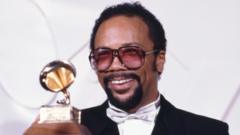Jones’s journey started on the tough streets of Chicago, where his childhood was marred by challenges, including his mother’s mental health struggles and his father's criminal connections. His early years were riddled with brushes with violence, yet a life-changing encounter with a piano redirected his fate. By 14, he was performing with legendary artists like Ray Charles and Billie Holiday, setting the stage for a remarkable career.
In the 1960s, he became the first African-American vice-president of a major record label at Mercury Records, where he produced chart-topping hits, including Lesley Gore’s “It’s My Party.” His groundbreaking work with Frank Sinatra further solidified his status in the industry—Sinatra referred to him as "one of the finest musicians I've ever known."
Jones gained critical acclaim for composing notable soundtracks, including his Oscar-nominated score for *In Cold Blood* and his work on *The Wiz*, where he recognized Michael Jackson's potential as a superstar. Their partnership led to the legendary *Thriller*, a hallmark album that redefined pop music in the 1980s.
Throughout his career, Jones maintained an astute ability to blend diverse genres, collaborating with artists across the spectrum. His vision helped create the charity song "We Are the World," leading to the production of multiple Grammy-winning projects and reviving classic sounds in a modern context.
Jones’s innovations extended into the realm of hip-hop, where he embraced this emerging genre and mentored many rising stars. His advocacy for social issues led him to establish charitable foundations, promoting civil rights alongside his musical endeavors.
Despite his success, his personal life was tumultuous, marked by struggles with addiction and health challenges. He endured several tumultuous marriages and faced a significant health scare in 2015, demonstrating resilience once again.
Quincy Jones leaves behind a legacy woven into the fabric of modern music. His unparalleled contributions and dedication to social justice have left an unforgettable mark, ensuring that future generations will continue to celebrate his extraordinary life and work as they contemplate a second memorial concert in his honor.
In the 1960s, he became the first African-American vice-president of a major record label at Mercury Records, where he produced chart-topping hits, including Lesley Gore’s “It’s My Party.” His groundbreaking work with Frank Sinatra further solidified his status in the industry—Sinatra referred to him as "one of the finest musicians I've ever known."
Jones gained critical acclaim for composing notable soundtracks, including his Oscar-nominated score for *In Cold Blood* and his work on *The Wiz*, where he recognized Michael Jackson's potential as a superstar. Their partnership led to the legendary *Thriller*, a hallmark album that redefined pop music in the 1980s.
Throughout his career, Jones maintained an astute ability to blend diverse genres, collaborating with artists across the spectrum. His vision helped create the charity song "We Are the World," leading to the production of multiple Grammy-winning projects and reviving classic sounds in a modern context.
Jones’s innovations extended into the realm of hip-hop, where he embraced this emerging genre and mentored many rising stars. His advocacy for social issues led him to establish charitable foundations, promoting civil rights alongside his musical endeavors.
Despite his success, his personal life was tumultuous, marked by struggles with addiction and health challenges. He endured several tumultuous marriages and faced a significant health scare in 2015, demonstrating resilience once again.
Quincy Jones leaves behind a legacy woven into the fabric of modern music. His unparalleled contributions and dedication to social justice have left an unforgettable mark, ensuring that future generations will continue to celebrate his extraordinary life and work as they contemplate a second memorial concert in his honor.





















